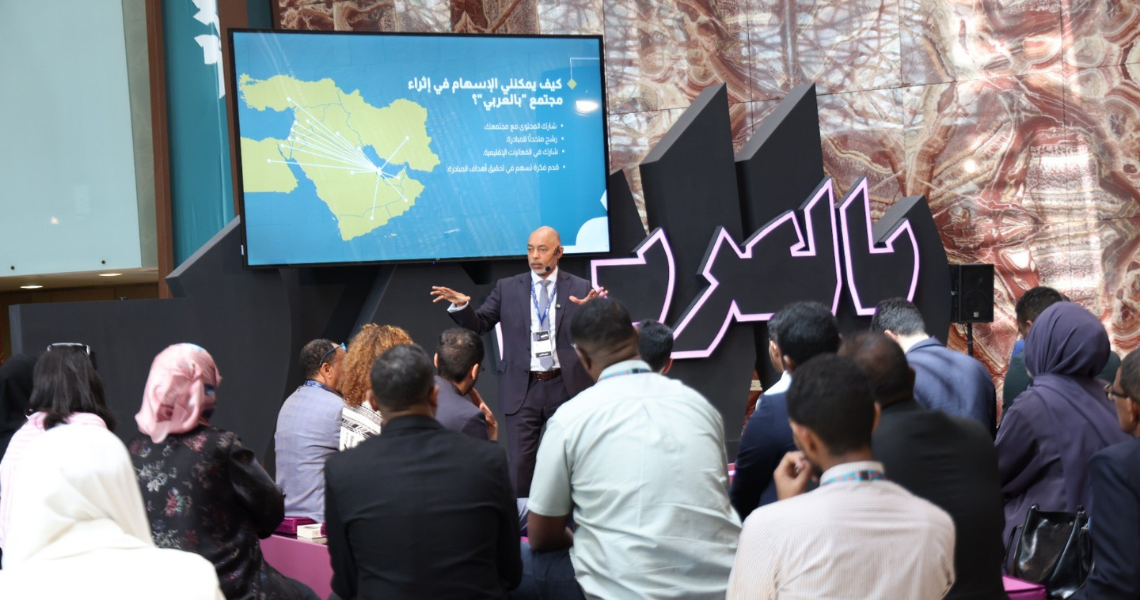Summit supports the revival of Arabic as a force for creativity and innovation in the modern world
Qatar Foundation has concluded the inaugural BilAraby Summit, following two days of rich dialogue, artistic expression, and cultural exchange that brought together more than 800 participants from across the Arab region and beyond.
Held at Multaqa (Education City Student Center), the Summit created a vibrant space for over 20 speakers, panelists, and storytellers from diverse backgrounds who explored how the Arabic language can remain a living force in today’s world.
Dr. Abdul Wahid Zainal, a speaker at the Summit and founder of Camel Code Academy, said: “The BilAraby Summit spread awareness of the importance of enhancing Arabic’s presence in the digital world. We hope this marks the beginning of real progress toward that goal.
“Our project focuses on teaching children about technology, one of today’s most critical skills. We help children explore areas of study such as artificial intelligence, cybersecurity, and coding. Since our children spend so much time on screens, we want to give them meaningful educational alternatives that empower them to become creators, not just consumers.”
Dr. Said Ismail, Acting President and Chief Scientific and Operations Office of Qatar Precision Health Institute, a member of Qatar Foundation, described BilAraby as a pivotal step toward reviving Arabic – not just as a linguistic heritage, but as a driver of creativity and innovation in the age of science and technology.
“We do not view Arabic as a static tradition, but as a living language that can interpret scientific and technological advancements with a distinctly Arab perspective,” he said. “This Summit has proven that our differences are not lines of division, but threads that, when woven together, form a vibrant tapestry of Arab identity.
“Our dialects and cultures are a source of endless wealth, and our gathering here is not just a celebration of the past, but a collaborative effort to build a future inspired by our heritage, responsive to today’s challenges, and imaginative in its solutions.”
The Summit offered a dynamic opportunity for sharing stories, lived experiences, and bold ideas, reinforcing Arabic as a language not only of tradition, but of transformation. Its second day saw a lineup of motivational talks, creative showcases, and thought-provoking conversations that bridged heritage and innovation.
In a session titled ‘Dampening the Force of Impact’, Baraa Al-Sarraj from Syria looked at how Arab societies cope with collective trauma and develop resilience, offering a psychosocial perspective grounded in shared memory and healing. Shawk Al-Alawi from Bahrain followed with a reflection on how professions become expressions of identity, weaving together personal narrative and societal change.
Dr. Amida Shaalan from Yemen delivered a talk titled ‘The Legacy of the Granddaughter of the Queen of Sheba’, offering a feminist perspective of Arab history through the lens of resistance and identity. In the session titled ‘The Line of Defense for Our Identity’, Dr. Laith Alawneh from Jordan underscored the need to preserve the Arabic language and culture in the face of global digital disruption.
The Summit also opened space for engaging discussions, where young people showcased real-life experiences, grassroots initiatives, and creative approaches that illustrated the evolving role of Arabic as a tool for innovation rather than a static heritage.
These open spaces served as hubs for dialogue and collaboration, with speakers including Muhannad Al-Dabi from Sudan, Taimur Al-Hadidi from Egypt, and Sumaya Al-Maimani from Kuwait, sparking conversations on digital culture, artificial intelligence, language, identity, and linguistic diversity. Meanwhile, Mohammad Al-Ramash from the Atheer Podcast and Bishr Al-Najjar from the Manbat – Sowt Podcast hosted a special session of The Arabic Podcast on the second day.
A defining feature of the Summit was its cultural diversity and the breadth of perspectives it brought together. Voices from the Gulf, the Levant, and the Maghreb infused the program with diversity and insight, revealing common threads and rich distinctions across the Arab world. This cross-regional dialogue underscored the potential of the Arabic language to act as a unifying force amid complexity.
The day concluded with a performance by Tunisian calligrapher Karim Jabbari who brought Arabic script to life in an expressive live display that captured the Summit’s theme – Ideas Have a Voice and an Echo.
The event was supported by educational and cultural organizations including Misk Foundation also known as Mohammed Bin Salman Foundation, QatarDebate, Qatar Reads, Qatar Foundation International, Sowt Podcast, The Diwan, Hamad Bin Khalifa University's Fanar Project, Al Sharq Forum, ArabiQuest, Sard Media Group, and Al Jazeera 360.
To view highlights from the Summit and learn more about Qatar Foundation’s BilAraby initiative, visit www.bilaraby.qa.



